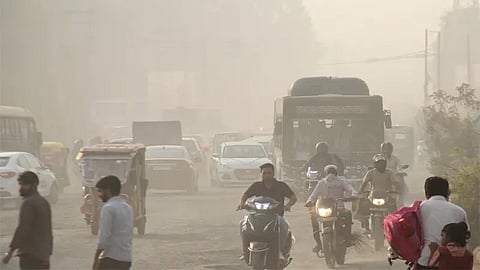

Delhi GRAP 4, What is GRAP 4, GRAP 4 GRAP 3 Difference, Delhi AQI Today: In a concerning development, multiple areas of New Delhi's Air Quality Index (AQI) reached the 'Severe Plus' category making India's National Capital and its surrounding area a gas chamber. The situation became so bad that Mundka's AQI touched 919 at 7 am on Monday. Notably, Delhi's Air Quality continues to remain very poor despite the fact the Commission for Air Quality Management (CAQM) already enforcing GRAP 3 in the Union Territory.
Due to the lack of respite in air pollution, the administration was left with no choice but to enforce GRAP stage 4 or GRAP 4 in the region. Now, the question arises how GRAP 4 is different from GRAP 3? Below is what you should know-
GRAP or Graded Response Action Plan is a set of emergency measures that are imposed to prevent the deterioration of air quality once it reaches a certain AQI level. GRAP is divided into four stages and therefore restrictions are different based on different stages. Stage 1 of GRAP kicks in when the AQI is in the 'poor' category (201 to 300).
GRAP's second, third, and fourth stages start three days ahead of the AQI reaching the 'very poor' category (301 to 400), 'severe' category (401 to 450), and 'severe +' category (above 450) respectively. Notably, if measures under Stage 2 are activated, measures under Stage 1 will continue to remain in place.
The difference between GRAP 4 and GRAP is based on the list of banned activities.
Talking about Delhi's AQI Today, as per Government's CPCB's 10 am forecast, Mundka's AQI was 495 i.e. severe category, Anand Vihar was 489, Chandani Chowk was 460, RK Puram was 478, etc.
Dr. Harpreet Singh while talking to True Scoop said, "In India, mouth and throat cancer is among the most common cancers. People who consume tobacco and smoke biddi that is unfiltered smoke. All these things cause mouth and throat cancer."
"There are many patients who come to the hospital who have never smoked but still get such type of cancers. That is all because of Air Pollution. The more Air Pollution is reduced, the more cases of cancer will be reduced. Pollution today is such that it is like smoking 15 to 16 cigarettes. Pollution is expected to rise in the coming winters. Breathing air with an AQI of more than 300 is like smoking 12 to 15 cigarettes a day."
Dr. Harpreet Singh is a Senior Consultant and HOD of the Department of Radiation Oncology at Mohandai Oswal Hospital (GT Road Byepass, Ludhiana).